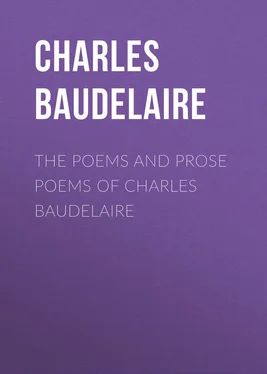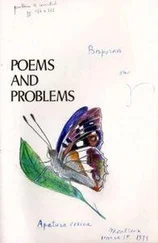Charles Baudelaire - The Poems and Prose Poems of Charles Baudelaire
Здесь есть возможность читать онлайн «Charles Baudelaire - The Poems and Prose Poems of Charles Baudelaire» — ознакомительный отрывок электронной книги совершенно бесплатно, а после прочтения отрывка купить полную версию. В некоторых случаях можно слушать аудио, скачать через торрент в формате fb2 и присутствует краткое содержание. Жанр: foreign_antique, foreign_prose, foreign_poetry, на английском языке. Описание произведения, (предисловие) а так же отзывы посетителей доступны на портале библиотеки ЛибКат.
- Название:The Poems and Prose Poems of Charles Baudelaire
- Автор:
- Жанр:
- Год:неизвестен
- ISBN:нет данных
- Рейтинг книги:4 / 5. Голосов: 1
-
Избранное:Добавить в избранное
- Отзывы:
-
Ваша оценка:
- 80
- 1
- 2
- 3
- 4
- 5
The Poems and Prose Poems of Charles Baudelaire: краткое содержание, описание и аннотация
Предлагаем к чтению аннотацию, описание, краткое содержание или предисловие (зависит от того, что написал сам автор книги «The Poems and Prose Poems of Charles Baudelaire»). Если вы не нашли необходимую информацию о книге — напишите в комментариях, мы постараемся отыскать её.
The Poems and Prose Poems of Charles Baudelaire — читать онлайн ознакомительный отрывок
Ниже представлен текст книги, разбитый по страницам. Система сохранения места последней прочитанной страницы, позволяет с удобством читать онлайн бесплатно книгу «The Poems and Prose Poems of Charles Baudelaire», без необходимости каждый раз заново искать на чём Вы остановились. Поставьте закладку, и сможете в любой момент перейти на страницу, на которой закончили чтение.
Интервал:
Закладка:
Charles Baudelaire
The Poems and Prose Poems of Charles Baudelaire / with an Introductory Preface by James Huneker
CHARLES BAUDELAIRE
For the sentimental no greater foe exists than the iconoclast who dissipates literary legends. And he is abroad nowadays. Those golden times when they gossiped of De Quincey's enormous opium consumption, of the gin absorbed by gentle Charles Lamb, of Coleridge's dark ways, Byron's escapades, and Shelley's atheism – alas! into what faded limbo have they vanished. Poe, too, whom we saw in fancy reeling from Richmond to Baltimore, Baltimore to Philadelphia, Philadelphia to New York. Those familiar fascinating anecdotes have gone the way of all such jerry-built spooks. We now know Poe to have been a man suffering at the time of his death from cerebral lesion, a man who drank at intervals and little. Dr. Guerrier of Paris has exploded a darling superstition about De Quincey's opium-eating. He has demonstrated that no man could have lived so long – De Quincey was nearly seventy-five at his death – and worked so hard, if he had consumed twelve thousand drops of laudanum as often as he said he did. Furthermore, the English essayist's description of the drug's effects is inexact. He was seldom sleepy – a sure sign, asserts Dr. Guerrier, that he was not altogether enslaved by the drug habit. Sprightly in old age, his powers of labour were prolonged until past three-score and ten. His imagination needed little opium to produce the famous Confessions. Even Gautier's revolutionary red waistcoat worn at the première of Hernani was, according to Gautier, a pink doublet. And Rousseau has been whitewashed. So they are disappearing, those literary legends, until, disheartened, we cry out: Spare us our dear, old-fashioned, disreputable men of genius!
But the legend of Charles Baudelaire is seemingly indestructible. This French poet has suffered more from the friendly malignant biographer and chroniclers than did Poe. Who shall keep the curs out of the cemetery? asked Baudelaire after he had read Griswold on Poe. A few years later his own cemetery was invaded and the world was put into possession of the Baudelaire legend; that legend of the atrabilious, irritable poet, dandy, maniac, his hair dyed green, spouting blasphemies; that grim, despairing image of a diabolic, a libertine, saint, and drunkard. Maxime du Camp was much to blame for the promulgation of these tales – witness his Souvenirs littéraires. However, it may be confessed that part of the Baudelaire legend was created by Charles Baudelaire. In the history of literature it is difficult to parallel such a deliberate piece of self-stultification. Not Villon, who preceded him, not Verlaine, who imitated him, drew for the astonishment or disedification of the world a like unflattering portrait. Mystifier as he was, he must have suffered at times from acute cortical irritation. And, notwithstanding his desperate effort to realize Poe's idea, he only proved Poe correct, who had said that no man can bare his heart quite naked; there always will be something held back, something false ostentatiously thrust forward. The grimace, the attitude, the pomp of rhetoric are so many buffers between the soul of man and the sharp reality of published confessions. Baudelaire was no more exception to this rule than St. Augustine, Bunyan, Rousseau, or Huysmans; though he was as frank as any of them, as we may see in the printed diary, Mon cœur mis à nu (Posthumous Works, Société du Mercure de France); and in the Journal, Fusées, Letters, and other fragments exhumed by devoted Baudelarians.
To smash legends, Eugène Crépet's biographical study, first printed in 1887, has been republished with new notes by his son, Jacques Crépet. This is an exceedingly valuable contribution to Baudelaire lore; a dispassionate life, however, has yet to be written, a noble task for some young poet who will disentangle the conflicting lies originated by Baudelaire – that tragic comedian – from the truth and thus save him from himself. The Crépet volume is really but a series of notes; there are some letters addressed to the poet by the distinguished men of his day, supplementing the rather disappointing volume of Letters, 1841-1866, published in 1908. There are also documents in the legal prosecution of Baudelaire, with memories of him by Charles Asselineau, Léon Cladel, Camille Lemonnier, and others.
In November, 1850, Maxime du Camp and Gustave Flaubert found themselves at the French Ambassador's, Constantinople. The two friends had taken a trip in the Orient which later bore fruit in Salammbô. General Aupick, the representative of the French Government, cordially the young men received; they were presented to his wife, Madame Aupick. She was the mother of Charles Baudelaire, and inquired rather anxiously of Du Camp: "My son has talent, has he not?" Unhappy because her second marriage, a brilliant one, had set her son against her, the poor woman welcomed from such a source confirmation of her eccentric boy's gifts. Du Camp tells the much-discussed story of a quarrel between the youthful Charles and his stepfather, a quarrel that began at table. There were guests present. After some words Charles bounded at the General's throat and sought to strangle him. He was promptly boxed on the ears and succumbed to a nervous spasm. A delightful anecdote, one that fills with joy psychiatrists in search of a theory of genius and degeneration. Charles was given some money and put on board a ship sailing to East India. He became a cattle-dealer in the British army, and returned to France years afterward with a Vénus noire, to whom he addressed extravagant poems! All this according to Du Camp. Here is another tale, a comical one. Baudelaire visited Du Camp in Paris, and his hair was violently green. Du Camp said nothing. Angered by this indifference, Baudelaire asked: "You find nothing abnormal about me?" "No," was the answer. "But my hair – it is green!" "That is not singular, mon cher Baudelaire; every one has hair more or less green in Paris." Disappointed in not creating a sensation, Baudelaire went to a café, gulped down two large bottles of Burgundy, and asked the waiter to remove the water, as water was a disagreeable sight; then he went away in a rage. It is a pity to doubt this green hair legend; presently a man of genius will not be able to enjoy an epileptic fit in peace – as does a banker or a beggar. We are told that St. Paul, Mahomet, Handel, Napoleon, Flaubert, Dostoiëvsky were epileptoids; yet we do not encounter men of this rare kind among the inmates of asylums. Even Baudelaire had his sane moments.
The joke of the green hair has been disposed of by Crépet. Baudelaire's hair thinning after an illness, he had his head shaved and painted with salve of a green hue, hoping thereby to escape baldness. At the time when he had embarked for Calcutta (May, 1841), he was not seventeen, but twenty years of age. Du Camp said he was seventeen when he attacked General Aupick. The dinner could not have taken place at Lyons because the Aupick family had left that city six years before the date given by Du Camp. Charles was provided with five thousand francs for his expenses, instead of twenty – Du Camp's version – and he never was a beef-drover in the British army, for a good reason – he never reached India. Instead, he disembarked at the Isle of Bourbon, and after a short stay suffered from homesickness and returned to France, after being absent about ten months. But, like Flaubert, on his return home Baudelaire was seized with the nostalgia of the East; over there he had yearned for Paris. Jules Claretie recalls Baudelaire saying to him with a grimace: "I love Wagner; but the music I prefer is that of a cat hung up by his tail outside of a window, and trying to stick to the panes of glass with its claws. There is an odd grating on the glass which I find at the same time strange, irritating, and singularly harmonious." Is it necessary to add that Baudelaire, notorious in Paris for his love of cats, dedicating poems to cats, would never have perpetrated such revolting cruelty?
Читать дальшеИнтервал:
Закладка:
Похожие книги на «The Poems and Prose Poems of Charles Baudelaire»
Представляем Вашему вниманию похожие книги на «The Poems and Prose Poems of Charles Baudelaire» списком для выбора. Мы отобрали схожую по названию и смыслу литературу в надежде предоставить читателям больше вариантов отыскать новые, интересные, ещё непрочитанные произведения.
Обсуждение, отзывы о книге «The Poems and Prose Poems of Charles Baudelaire» и просто собственные мнения читателей. Оставьте ваши комментарии, напишите, что Вы думаете о произведении, его смысле или главных героях. Укажите что конкретно понравилось, а что нет, и почему Вы так считаете.












